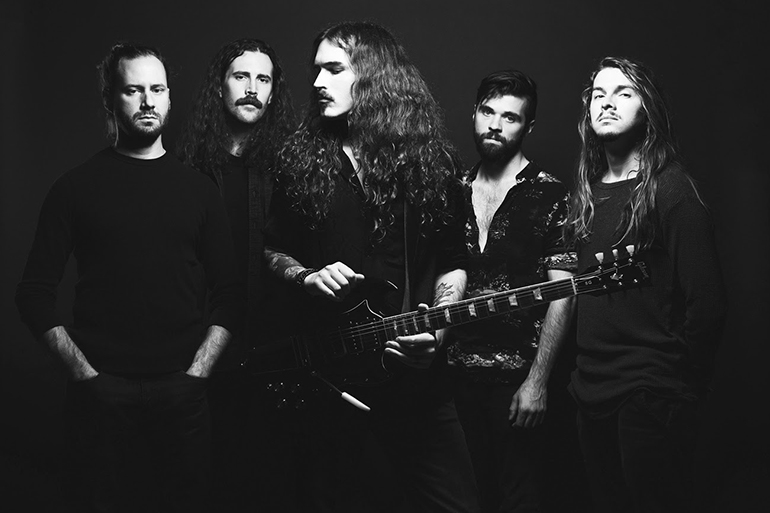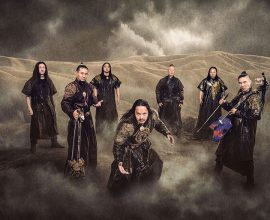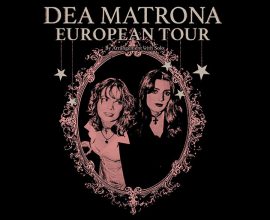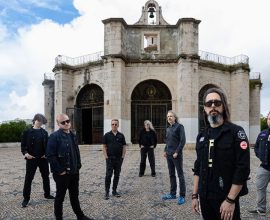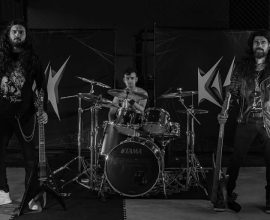Bastion Rose: “Our music is a living, breathing force of chaos and hope”
Emerging from a period of profound personal challenges, Bastion Rose has transformed raw adversity into a cinematic, emotionally charged rock experience. Building on the themes of survival and resilience explored in their debut EP Fade To Blue, the band’s full-length debut, Traces of Gold, expands into a layered exploration of strength, temptation, and transformation. With heavy riffs, dynamic melodies, and a cinematic approach honed alongside legendary producer David Bottrill, Bastion Rose crafts music that is both unflinching and deeply human.
By Sandra Pinto
In this interview, the band delves into their songwriting evolution, the creation of the infectious single “Wild Honey,” and the immersive visual and sonic world that defines Traces of Gold.
Traces of Gold builds on the themes you explored in Fade To Blue. How has your songwriting evolved since that debut EP?
Fade To Blue was an essential, raw response to immense personal hardship—it was about survival and finding the foundational strength (the ‘bastion’). The songwriting was focused on processing that immediate, raw grief. With Traces of Gold, the process evolved into a much broader, philosophical exploration. We weren’t just searching for strength; we were defining what resilience truly means. This allowed the songs to become more intricate, dynamic, and cinematic. The narratives are more complex, and we felt permission to push our technical and emotional boundaries, evolving our sound into a layered, theatrical experience.
“Wild Honey” feels like a powerful statement — what does this track represent for Bastion Rose at this point in your journey?
“Wild Honey” is our statement of unapologetic power and groove. It represents Bastion Rose operating at maximum intensity, confidently hitting that fusion point between our classic and modern influences. As the last single before the full album drops, it’s designed to be the definitive tease—heavy, seductive, and totally infectious. It’s a testament to the raw energy and confidence we found while recording the album.
How did the song come together creatively? Was there a particular riff, lyric, or moment that sparked the idea?
This song was born from that core heavy, driving riff. It had this dark, almost swaggering energy from the start, reminiscent of Black Sabbath’s weight. The lyric “Treasure grown from the black earth” quickly anchored the theme—this idea that the most seductive, intense pleasure or desire (the “Wild Honey”) often comes from a deep, hidden, and perhaps dangerous source. It immediately established the song’s tension between temptation and consumption.
The title “Wild Honey” is intriguing. What does it symbolize in the context of the song?
“Wild Honey” symbolizes addiction, temptation, and inescapable desire. It’s the thing that is sticky and sweet—that pleasure you crave—but the lyrics ask whether you are consuming it, or if it is consuming you. It’s a powerful metaphor for any indulgence or fixation that pulls you away from balance, whether it’s love, chaos, or something darker.
How does “Wild Honey” set the tone for Traces of Gold?
“Wild Honey” sets the tone by showcasing the raw, riff-heavy power on the album. While Traces of Gold has dynamic range—from atmospheric Pink Floyd moments to the explosive intensity of “Atlas Slumbers”—”Wild Honey” proves we can deliver a relentless, memorable groove. It is the core, heavy pulse of the record.
The album has been described as a journey of resilience and transformation. Can you share what personal or collective experiences inspired that theme?
The theme is deeply personal, stemming largely from the challenges I faced leading up to the band’s formation, including the loss of both my parents and my personal battle with cancer, which threatened my voice. The album’s concept is the result of working through that darkness. It’s the realization that those experiences left behind “Traces of Gold”—the valuable insights and unwavering strength gained through enduring the heaviest struggles. It’s an honest narrative about finding light, not by ignoring the darkness, but by letting it pass through you.
Production & David Bottrill.
Working with David Bottrill is huge! What was it like collaborating with a producer who’s shaped records for legends like Tool and Rush? How did this experience shape the songs and the sound?
Collaborating with David Bottrill was an honor and a significant learning experience. He has an unparalleled ear for dynamic range and texture. He didn’t try to change who we were; he simply elevated our identity. He ensured every single riff, every emotional beat, and every layer of atmosphere served the song’s ultimate goal. This experience shaped the sound by giving the low-end a surgical, defined heaviness and allowed the vocals and melodies to cut through with absolute clarity, resulting in a sound that feels simultaneously massive and focused.
How did working with David Bottrill influence the sound and direction of Traces of Gold?
A: David influenced the direction by encouraging us to embrace the tension and release inherent in our songwriting. He pushed us on arrangements, making sure the instrumental passages weren’t just filler, but cinematic movements that contribute to the narrative. He instilled a discipline where every element has to earn its place, leading to a record that is incredibly tight but still feels huge and emotionally expansive.
The track has a thick, groove-driven energy — did you set out to capture a specific mood or vibe in the production?
Absolutely. For “Wild Honey,” the mood was about seduction and primal drive. We wanted the production to feel oily, dark, and irresistible. David helped us achieve that thick, almost palpable groove by ensuring the drums and bass locked in perfectly, giving the low-end weight while leaving space for the guitar riffs to have that crucial cutting edge, capturing that feeling of being completely consumed by desire.
David Bottrill has an impressive history with artists like Tool, Rush, and Godsmack — what did he bring to your sessions that elevated your sound?
Beyond his technical brilliance, David brought an uncompromising focus on intention. He constantly asked, “What does this section feel like? What is the narrative here?” This forced us out of autopilot. He’s a master of dynamic staging; he taught us how to use silence and texture to make the heavy parts feel even heavier. It’s that attention to sonic detail and emotional honesty that truly elevated our sound.
Your sound has been described as a mix of classic rock and post-grunge. Who are some of your biggest musical inspirations, and how do they come through in this new album?
Our influences are split between the epic scale of the past and the intensity of the 90s. Black Sabbath provides the foundational heaviness and doom-laden riffing. Pink Floyd is the blueprint for our atmospheric scope and theatrical dynamics. The post-grunge side, notably Soundgarden and Tool, is where we draw our rhythmic complexity, raw, bluesy vocal delivery, and psychological depth. You hear these influences in the dense layers of a track like “Garden of Stone” and the pure groove of “Wild Honey.”
How do you balance the heavier, darker textures in your music with moments of melody and atmosphere?
It’s all about the tension and contrast. The darkness provides the context for the light to matter. The heavier textures (the ‘bastion’) are the bedrock, but the melody (the ‘rose’) is what makes the music memorable and human. We use atmospheric passages—often influenced by Pink Floyd—to set a mood, allowing the listener to process the emotional weight before the massive riffs and powerful melodic choruses hit with full force. It’s an intentional push-pull dynamic.
What was your recording process like, did you track live together or build the songs piece by piece?
We primarily tracked the core foundation live—drums, bass, and rhythm guitar—to ensure we captured the natural, undeniable groove and energy of the band interacting in the moment. The power of a David Bottrill production is rooted in that live feel. We then layered the atmospheric guitars, keys, and vocals piece by piece to build the cinematic textures and harmonic complexity on top of that solid, live foundation.
Were there any unexpected sounds, instruments, or techniques that found their way into the record?
We definitely experimented with unexpected textures, particularly around the transitionary tracks. On “Garden of Stone,” the haunting instrumental prelude “Parallax” uses subtle, arpeggiated guitar melodies and unique piano textures that might not sound like traditional hard rock but build the perfect atmospheric bridge into the main track’s central theme of reckoning.
You’ve been creating short films to accompany each release. How does the visual side of Bastion Rose connect to the music?
The visual side is not merely promotional; it’s narrative extension. Our music deals with universal themes of chaos, seduction, life, and death. The short films give us the space to explore those concepts visually, giving the songs a deeper emotional context. We believe a powerful rock record should be a complete sensory experience.
What’s the concept or imagery behind the “Wild Honey” video?
The “Wild Honey” video focuses entirely on the seductive, dangerous nature of desire and consumption. The imagery is dark, luxurious, and visceral, playing on the lyrics about the “sticky and sweet” pleasure that is simultaneously irresistible and consuming. It features abstract visuals like a gold spider and thick, luminous honey pouring over dark textures, embodying the idea that this desire, while beautiful, is a trap.
Do you see these visuals as extensions of the songs or as standalone artistic pieces?
They function as extensions of the songs. While each video is designed to hold up as a conceptual short film on its own artistic merits, their primary purpose is to deepen the emotional and philosophical themes introduced in the lyrics and music. They are meant to be consumed together.
How involved is the band in directing or conceptualizing these short films?
Extremely involved. The band is central to the conceptualization and direction of every film. The music and lyrics provide the initial brief, and we work closely with the director to ensure the final visual script perfectly mirrors the emotional arc and thematic complexity of the track.
This is your full-length debut, what was the biggest challenge in shaping a complete album versus releasing singles or an EP?
The biggest challenge was ensuring the narrative flow worked perfectly from Track 1 to Track 12. With an EP, you can have four great songs; with an album, you need a story, dynamic peaks and valleys, and thematic consistency. We meticulously ordered the songs and created interludes to ensure the album felt like one continuous, immersive journey, not just a collection of singles.
What do you hope people feel when they first hear Traces of Gold from start to finish?
I want them to feel gripped, moved, and ultimately hopeful. It’s okay to acknowledge the darkness and the struggle, but I hope by the end, they feel a profound, cathartic release. I want them to put the headphones down and feel that enduring sense of resilience—that they, too, have those “Traces of Gold” within them.
If listeners could take one message or feeling away from Traces of Gold, what would you want it to be?
I want them to take away this message: The beauty and meaning of life are found in its fragility. Don’t try to carry the whole world; be strong enough to acknowledge the struggle, but ultimately, be brave enough to live and be present.
How has the band evolved musically and personally since your Fade To Blue EP?
Musically, we’ve found our sonic identity—we know exactly where we sit in the rock landscape. Personally, the whole process has been a healing crucible. The band started as a therapeutic project, and now it has grown into a collective force that validates the struggle and shows that immense creativity can emerge from true adversity.
With growing international attention, how are you approaching your next chapter: touring, creative direction, or future collaborations?
Creatively, we’ve already started sketching concepts for the next record, aiming to explore even deeper psychological narratives. You heard it here first…there’s a lot more music coming from Bastion Rose in 2026.

